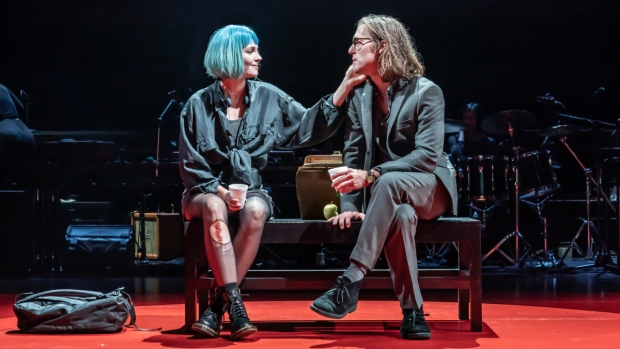Closer at the Lyric Hammersmith – review

© Marc Brenner
“Have you ever seen a human heart? It looks like a fist wrapped in blood.” Yes, 25 years after first searing its way onto the stage of the National, and into the collective cultural consciousness of the time, Patrick Marber’s coruscating dissection of the boundaries between sex and love, and the sheer brutality of human feeling, retains its power to shock, thrill and illuminate. A quartet of damaged souls thrash about, inflict pain, deceive each other, and interconnect in the urban landscape that is late 1990s London but could really be any city where so-called civilised people operate, their sophisticated exteriors mere veneers over the roiling, selfish, primitive instincts beneath.
In many ways, it’s a deeply cynical play: all four characters behave appallingly at times and the concept of deceit as a valid, overriding currency in matters of the heart is pretty uncomfortable. Marber, however, invests each of his people with enough humanity to make this so much more than a mere trawl through the underbelly of romantic and sexual cruelty: we may not always like them but it’s consistently clear where they’re coming from. Compassionate photographer Anna was jettisoned by her ex-husband for a younger woman, writer Dan nurses a well of unexplored grief, Larry the doctor comes from a working class background and struggles to reconcile his egalitarian instincts with the desire to make money, and youthful, free-spirited Alice, while no angel, is a blank canvas with a desire to be loved (“That simple?” asks Dan at their first meeting, to which she counters “it’s a big want”).
In Marber’s forensically observed world, it’s not just a big want, it’s an unattainable one, unless you’re prepared to make considerable emotional sacrifices. This quartet vacillate between purity and muddy compromise, and most of the exchanges are as riveting as they are bruising. The sensational original production, directed by the author, started with a bare stage that retained physical elements from each successive scene until finally the playing space was crowded with detritus, like a visual manifestation of the scars of repeated unsuccessful relationships, but also of the text itself where repetition of certain phrases paint a vivid picture of shared, painful experience. It also helped mitigate against a couple of absurdly convenient plot contrivances that serve to throw characters together but went against the stark brilliance of the dialogue.
By contrast, Clare Lizzimore’s new staging is refreshingly spare on some levels but frustratingly busy on others: Soutra Gilmour’s black box set with a blood red forestage is populated by, as well as the actors, a pair of terrific musicians (Arun Ghosh and Radhika Aggarwal) and an additional quartet of supernumeraries so dimly lit that it’s hard to work out exactly what they’re doing back there. It’s an embellishment that Marber’s extraordinary text doesn’t need, and also draws focus from the central performances.
Of these, it’s Sam Troughton’s stunningly well-rounded doctor that lingers in the mind longest. Troughton draws a detailed portrait of Larry as a self-made man constantly on the brink of self-destruction, barely able to comprehend his luck at getting with Nina Toussaint-White’s captivating, charismatic Anna, and with edges of unreconstructed aggression but also innate, flawed kindness. It’s a devastating performance, full of fire, grit and emotional intelligence. His ability to go from dangerous to distraught in the blink of an eye is astonishing.
Jack Farthing invests Dan with wit and fascinating casual cruelty that works superbly for the most part, though ultimately he appears so detached that it’s hard to see why these women fall for him. Alice is an elliptical figure, at once earthy yet ethereal and ideally requiring a haunting mixture of recklessness and vulnerability. Ella Hunt has some terrific moments (the opening to act two where she bares everything but her soul to a deeply unhappy Larry in a sex club is brilliantly ambiguous) but reads as too sweet and insufficiently wild. The concept of having Alice comment in full-throated Brechtian song throughout act one is powerful, and provides her with additional agency, but is then bafflingly abandoned for the second half.
The sexual politics of the piece (at one point, Larry says to Alice “you don’t understand the territory because you are the territory”) seem more unpalatable now than in 1997, as do the male characters’ frequent references to women as though they are pawns in a macho chess game. It would be lovely, if naive, to think that such attitudes no longer exist, but whether or not contemporary audiences will want to go and immerse themselves in such unreconstructed banter is a question. Those that do venture to Hammersmith will encounter a modern masterpiece that, even in an imperfect production, remains rivetingly provocative.













